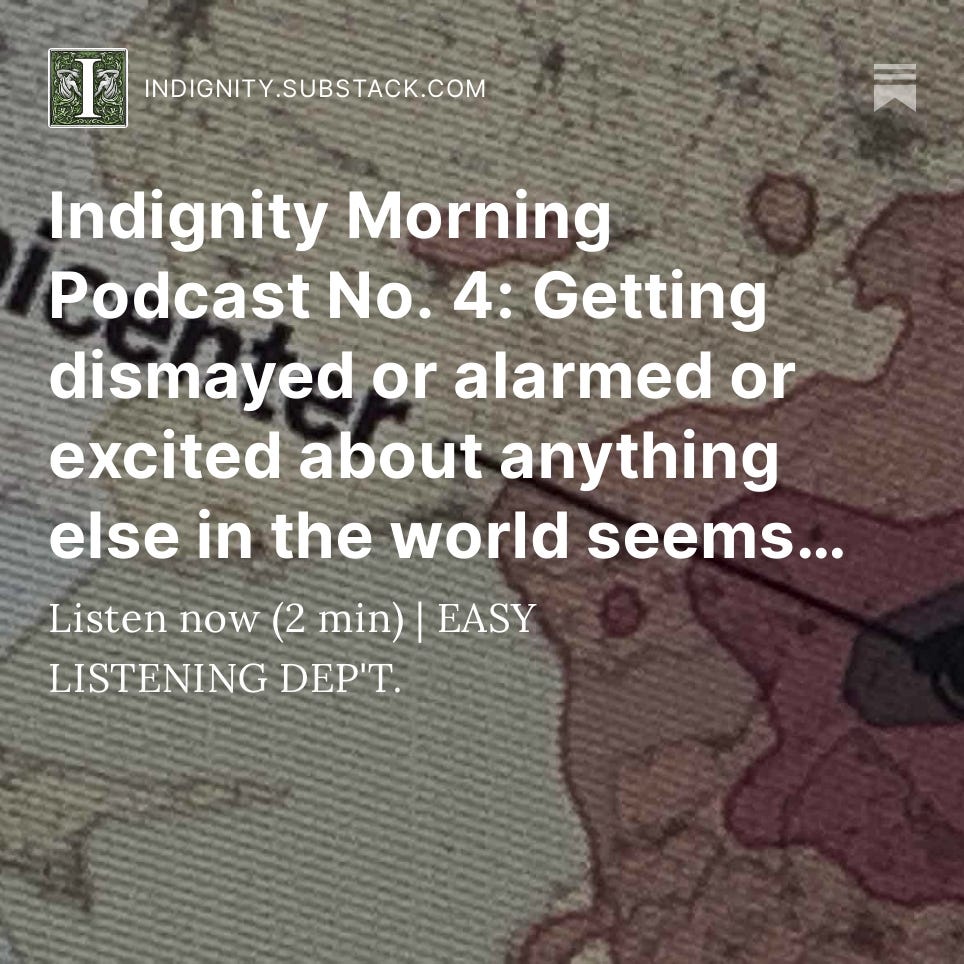INDIGNITY VOL. 3, NO. 10: The takes that keep on giving.
RECONSIDERATIONS DEP'T.

EASY LISTENING DEP'T.
The Indignity Morning Podcast

YOU can have the Indignity Morning Podcast delivered separately to your electronic mail in-box! We don’t add subscribers automatically, we want you to be in charge! Head to Manage your subscription, where you can select and choose which sections to receive. More info here.


The Endless Melody of Stephen A. Smith
I WAS WATCHING the HBO Bomani Jones show, Game Theory, partly because I enjoy Bomani Jones and more because some of my old Deadspin pals are behind the scenes. Each show includes a sit-down segment where Jones talks to someone else in the world of sports, or the world of talking about sports. In this most recent episode, his guest was Stephen A. Smith.
The segment was, as chat segments go, not great TV. Smith hunkered down in his armchair, cuffs well shot from his suit jacket sleeves, and did what he has become incredibly famous and wealthy by doing: he talked, and he talked some more, stringing together some platitudes that came out a little pugnacious, or some pugnaciousness that came out a little platitudinous, but mostly just riding his own momentum.
Jones fed him a variety of prompts—inviting him to promote his new book, pressing him about why he works with Sean Hannity, asking about the weight of speaking about social issues—and Smith responded to each one, or spoke after each one in the place a response would go, with the same relentless flow and tone. He rattled off his rendition of someone else selling him on writing a memoir ("All right, what about you, who are you, what you think, how do you feel, how'd you come to think like this, what's your perspective, where'd you get it from, who gave you the right to have this kind of opinion?") and his play-by-play of the killing of Tyre Nichols ("Had another officer come out of nowhere and act like he was kicking a field goal, he kicked him in the face twice, you had another officer that jumped on him and hit him with a baton at least twice...I watched all 66 minutes of the video") with different shadings but matching theatrical assurance, leaving the camera no choice but to hang on every syllable.
Again and again, reaching the point where a regular person would have let their remarks coast to a stop, Smith stepped back on the gas, swung into the next lane, and returned to cruising speed. I was so impressed I went back and timed it: by my count, Jones spoke for 36 seconds in the segment, while Smith held forth for 3:32.
Bomani Jones is excellent at talking to people on TV. That's why he has a talk show. He is a good arguer, pushing back against cliches and constantly working to find an angle from which to deliver a point. Game Theory makes deft use of segments where Jones goes out and riffs with ordinary and non-ordinary people on the street about each episode's main theme, swapping off the roles of straight man and comedian with them as they go.
None of that give-and-take was there with Smith. I'd kept waiting for the conversation to become a conversation, and belatedly I realized I was thinking about it all wrong—I was thinking about the very concept of Stephen A. Smith all wrong.
Stephen A. Smith isn't on TV to talk with people. He was, in effect, Game Theory's musical guest, there to deliver his signature sounds in his accustomed manner. Jones was just a spectator to the interaction between Smith and the ears of the audience.
One one level—the level on which workaday writers and commentators like to think they do their jobs—this is incredibly grating. As a formulator of commentary, Smith may be one of the most disengaged people alive: devoid of new ideas, ignorant of the finer points of whatever he's talking about, uninterested in stopping the flow of words to insert any particular thought or meaning.
On that level of pure word-flow, though, he's an incredibly dedicated craftsman. He operates in the great American performance tradition where James Brown had the child preacher Al Sharpton for a protege, the tradition where there's no real boundary between singing and preaching, and between preaching and signifying. Over time he has refined his old blurting and yapping into a rich, resonant instrument, full of striking colors and near-melodic shifts in tone. As a vocal performer, Smith is up in the stratosphere with prime Donald Trump.
Each weekday morning now I spend 15 or 20 minutes talking into a microphone, to put together about five minutes' worth of audio, which comes out a minute shorter than that once the worst of the agonizing pauses have been edited out. The courage and confidence to just talk into dead silence, and to keep talking, and then to talk some more—people talk about "being in love with the sound of your own voice" as a vice, but if you really put care into that relationship, it becomes a point of professionalism.

INDIGNITY is a general-interest publication for a discerning and self-selected audience. Is it for you? It could be!






